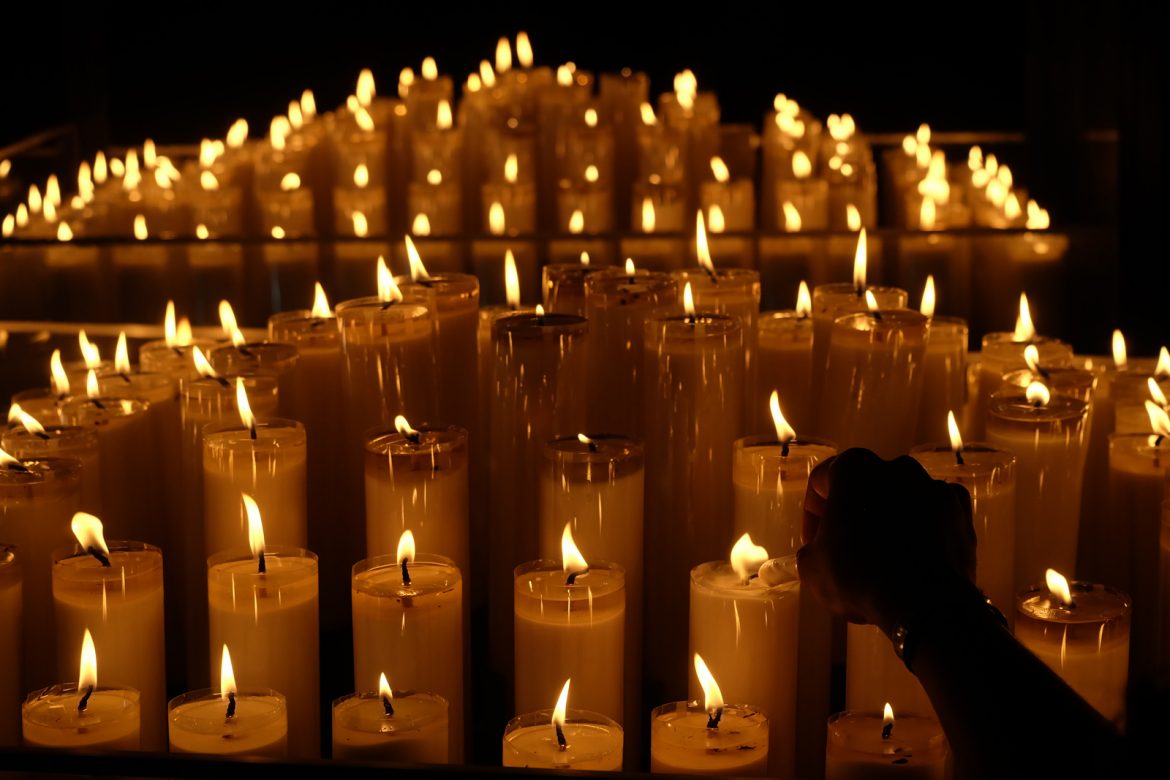The smoky haze was so bad today you couldn’t see the foothills just beyond town. There was only a faint smell of smoke from the wildfires here in northern California however, and the air quality, surprisingly, wasn’t bad. Even so, there’s a seeping sorrow in the murky skies that goes beyond physical unpleasantness.
Just as one became present beside the stream in the parkland, a bright yellow bird landed on a nearby branch. It only stayed for a couple seconds before flying off, but it was enough to open the gates to meditation. The mind grew as still as the leaves, which didn’t so much as flutter a millimeter in the penetrating stillness.
Though in the middle of town, it was very quiet. The quiet brought stillness, and the stillness ushered in the silence that’s always there, beyond the noise of man the sounds of nature.
There’s a benediction beyond words and concepts, beliefs and religions. There was only a spontaneous reverence, bottomless mystery, and an all-encompassing love that thought, the mind of man, can never know.

How easy it is to lose sight of the truth, especially during these dark, dismal days, that nature is not of man’s world, but is perpetually unknowable and mysterious, no matter how much knowledge humans accumulate and how much man fouls the earth.
The illusion of selfhood falls away with passive awareness of the movement of life: the gently flowing stream reflecting the late afternoon light off its flat stretches; the curious birds that fly up to share a moment of creaturehood; even the motionless leaves, dust-coated after months without rain.
Why, if the self is an illusion, is there such a strong assumption and feeling that ‘I’ am in control of ‘my’ actions?
As heretical as it is to our individualistic, post-modern ears, there’s a direct relationship between the strength of the assumption of selfhood and the fragmentation and folly, disorder and darkness of society.
Secondly, if God, in any sense of the word, is actually primary, why is the world so hellish?
Christians with their Bible and beliefs about Jesus are no closer to resolving these riddles than pre-agricultural peoples with their myths and spirits.
Sunday priests and preachers say, “I stand up in front of everyone and proclaim the presence of an invisible God.” In truth, at best they proclaim the existence of an invisible God, which is rarely present in their churches.
God supposedly flows through Roman Catholic and spinoff Protestant priests. That’s one of the originating Big Lies of Christianity. As everyone should know by now, priesthood confers no holiness.
There have been very few human beings who could convincingly make a claim that the spirit of God flowed through them. Jesus was one to my mind. Buddha was another (though God by a different name). But God automatically incarnating through a line of priests, Catholic or Protestant? That’s absurd, even blasphemous.
It’s half-true and misleading to say we are “habituated by my daily life and our broader culture to focus on the ‘horizontal’ or immanent, aspects of life — those things we can observe and measure without reference to God, mystery or transcendence.”
There are two, quite antithetical meanings to the word ‘immanent.’ The first definition, and the way I use the word, means, “indwelling, inherent, as in, ‘beauty is not something imposed but something immanent.’”
God in this sense is not an entity apart, a Creator, but that unnamable essence that is present every moment in every magnificent cumulus or lowly blade of grass. God is not just potentially within us, but actually within everything.
In a fully conscious way, God is latently present in every person, but thought and self, belief or unbelief, block communion.

Priests use the word ‘immanent’ as opposed to transcendent, in keeping with its second definition: “being within the limits of possible experience or knowledge — compare transcendent.”
In truth, immanence and transcendence are synonymous, not opposed. All human beings have the capacity for the mystical experiencing of God. And yes, the experiencing of what we call God is always mystical, in the sense of irreducible mystery, beyond knowledge and previous experience.
Therefore to a person of mystical experiencing, it seems childish to proclaim, “Blessed be God, Father, Son and Holy Spirit.” Besides the needless reminder of God’s blessedness, the Christian Trinitarian conundrum is unnecessary and nonsensical.
It’s deeply disingenuous to say, “let’s discuss our deepest questions, longings and loves and the rituals and habits that form who we are and the way we walk through the world,” while actually holding up “the Bible that remains the same.”
The Bible, or any other scripture, however inspired, are, like churches themselves, composed and constructed by the human mind. And in this world and age at least, belief systems and dogmas are inimical to human freedom, as well as communion with the numinous.
Martin LeFevre

